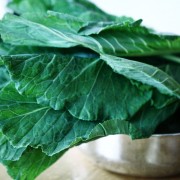Collard Greens – A Southern Staple
Chances are, if you are from the South you have been around a pot or two of collard greens. I can still remember the smell of them cooking on my grandmother’s stove on Sunday afternoons. Fast forward many years later, I am standing in my own kitchen with a beautiful bunch of fresh collard greens from my Seasonal Roots basket, wishing that I had paid better attention to grandma’s recipes and methods all those years ago. In fact, up until this past week, I had never cooked or eaten collard greens on my own as an adult.
Thanks to some tips and encouragement from my fellow Market Manager, Brian, I decided to tackle collard greens once and for all using this crock-pot friendly recipe. I am happy to report that the final result was a hit, and that the smell of them cooking all day brought back some wonderful memories of being in my grandmother’s kitchen. Thank you, Brian!
Crock-Pot Collard Greens
Ingredients:
Collard greens, stemmed and chopped
1 medium onion, quartered
Garlic, minced (I used about 2-3 cloves)
Vegetable stock and water (half and half, enough to cover ingredients)
2 tablespoons cider vinegar
½ tsp crushed red pepper flakes
Sea salt and ground black pepper, to taste
Ham hock (if desired)
Directions:
Wash greens and cut out thick stems. Stack greens in a pile, roll up like a cigar, and then slice. Place sliced greens into crockpot with remaining ingredients. Cover and cook on low for 6-8 hours. Enjoy!
Just for the fun of it, here are some of the Health Benefits of Collard Greens:
- Collard greens contain a both soluble and insoluble dietary fiber which can help control LDL cholesterol levels and offer protection against colon cancer diseases.
- Collards are a rich source of phyto-nutrients, which have potent anti-cancer properties, such as di-indolyl-methane (DIM) and sulforaphane that have proven benefits against prostate, breast, cervical, colon, ovarian cancers by virtue of their cancer-cell growth inhibition and cytotoxic effects on cancer cells.
- Collard leaves are also an excellent source of folates, vitamin C (a powerful natural anti-oxidant), Vitamin A (required for maintaining healthy mucus membranes and skin, and is also essential for healthy vision), Vitamin K (has a potential role in the increase of bone mass by promoting osteotrophic activity in the bone and can have a beneficial effect in Alzheimer’s patients by limiting neuronal damage in their brain), Vitamin B, and minerals like iron, calcium, copper, manganese, selenium, and zinc.
Sarah Young is a wife, mother of three, Certified Health Education Specialist, and healthy living advocate. She has a background in Dietetics and a B.S. in Health, Fitness, and Recreational Resources with a concentration in Health Promotion. She is also a writer for several local and online publications, an ambassador for the Jamie Oliver Food Foundation, and a health contributor for ABC 7 News/WJLA. In her spare time, she enjoys running, hiking, gardening, and spending time with her family and their dog, Maple.


